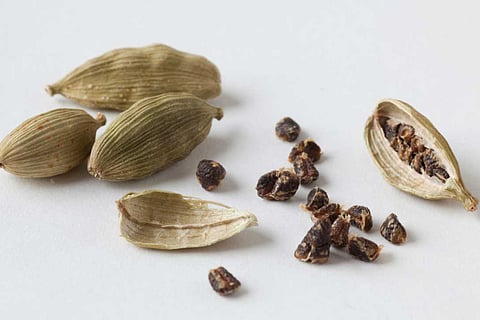
- LIFESTYLE
- FASHION
- FOOD
- ENTERTAINMENT
- EVENTS
- CULTURE
- VIDEOS
- WEB STORIES
- GALLERIES
- GADGETS
- CAR & BIKE
- SOCIETY
- TRAVEL
- NORTH EAST
- INDULGE CONNECT

There’s a spice sitting in most of our kitchens that’s more than just a flavour booster — it’s a natural remedy for everyday woes like acidity, bloating, colds and even low energy. Cardamom, popularly known as elaichi, is that spice. Whether you’ve overindulged at a party or eaten questionable takeout, cardamom can ease digestion, tame flatulence and soothe an upset stomach. It’s also a go-to for coughs & colds and runny noses, helping clear out mucus while calming your system.
This humble spice, part of the ginger family, has been a staple in homes worldwide for generations — and for a good reason. Think back to what your parents or grandparents kept in their kitchens. Before over-the-counter meds, they relied on spices like cardamom to tackle fevers, sniffles and tummy troubles because it stands out for its simple, accessible real benefits.
Take your daily tea or coffee — habits many of us can’t shake. Too much can leave you acidic, jittery and bloated. Add a pinch of cardamom, though and it changes the game. This spice neutralises caffeine’s harsh effects, thanks to a compound called cineole. Research has highlighted how cineole boosts digestion and reduces acid production, making your chai or coffee gentler on your gut. In the Middle East, locals sprinkle cardamom into their coffee for this very reason — a tradition now supported by studies showing its anti-inflammatory and antimicrobial perks.
Bloating and gas? Cardamom’s got you covered there, too. It helps food move smoothly through your intestines by cutting down excess mucus — a breeding ground for bacteria and viruses when it lingers. Have you ever noticed how mucus changes from white to yellow or green during a cold? Popping pills to dry it up might feel good in the short-term, but it traps the problem. Cardamom, on the other hand, encourages your body to expel it naturally. Cardamom’s antiseptic properties help clear respiratory and digestive mucus, speeding recovery from cold and easing IBS-like symptoms. Boil a few crushed pods in water, maybe with cinnamon or ginger and sip it after a heavy meal.
It’s a trick our ancestors used — think biryanis and curries laced with elaichi to digest rich, meaty dishes because cardamom stimulates digestive enzymes, breaking down proteins and fats more efficiently. Beyond digestion, cardamom’s antioxidants — like manganese — support blood pressure and circulation as well. Cardamom improves vascular health, a boon for anyone cutting back on caffeine but still craving a warm drink. So, how do you use it? Crush two or three pods, boil them in water and drink it plain or with a touch of honey. Add it to green tea, black tea or black coffee for a medicinal twist. After a wedding feast or late-night binge, this is your reset button. Overeating is the real culprit behind weight gain and sluggishness — cardamom won’t undo that but it softens the blow. Carry some pods when you travel.
Green cardamom is milder, while black cardamom packs a potent punch — both work wonders. Cardamom reduces gut inflammation and boosts immunity, making it a quiet hero in your spice rack. It’s not just about what you eat but how your body handles it. Next time you brew chai, toss in some elaichi. It’s not just a drink — it’s medicine.